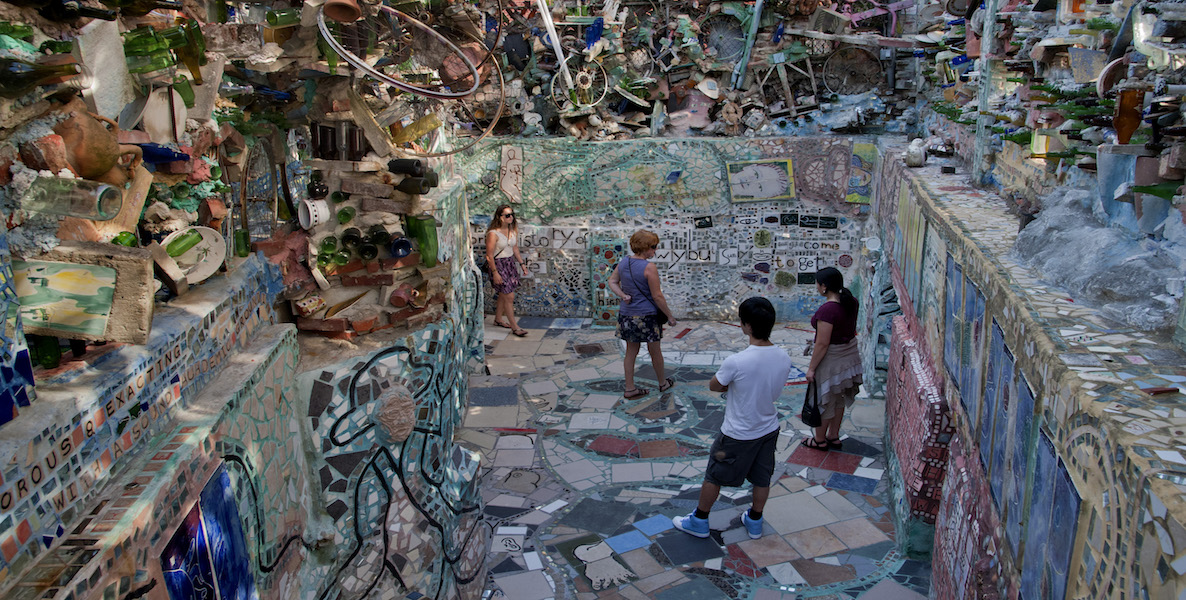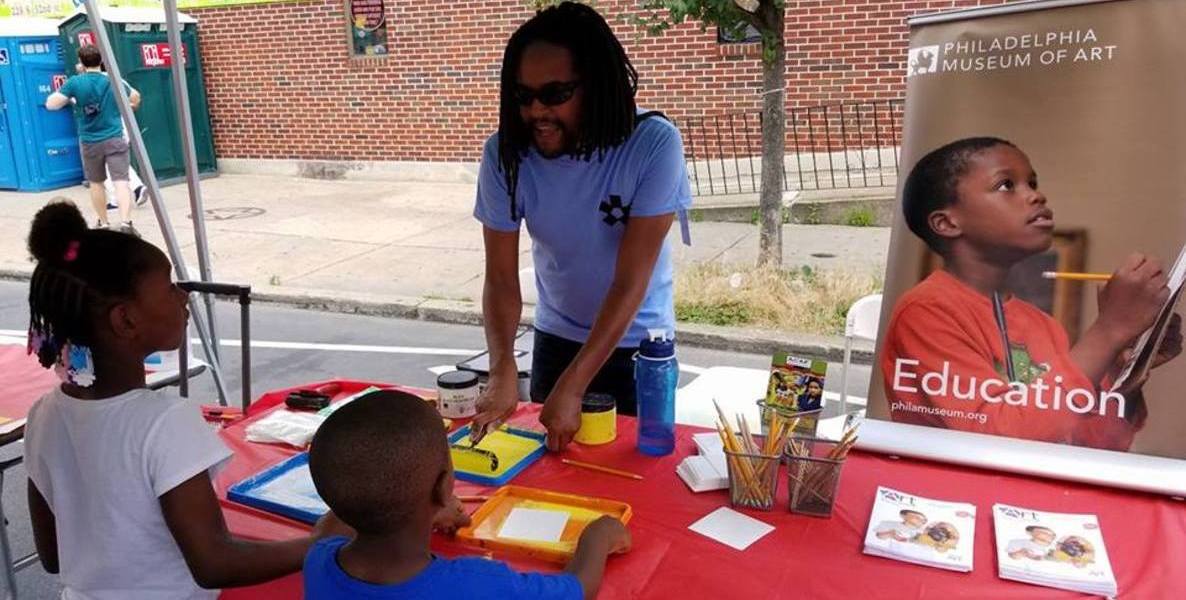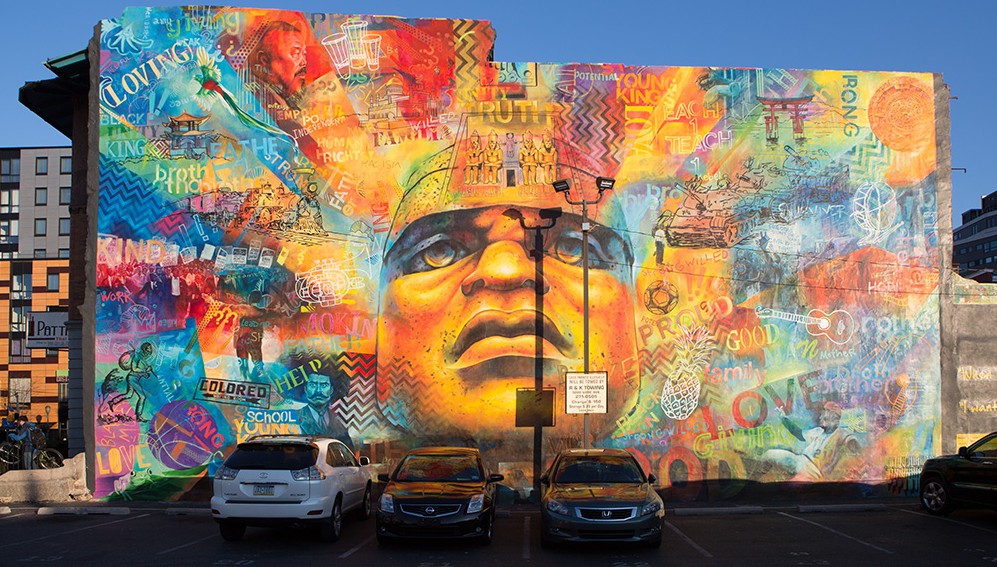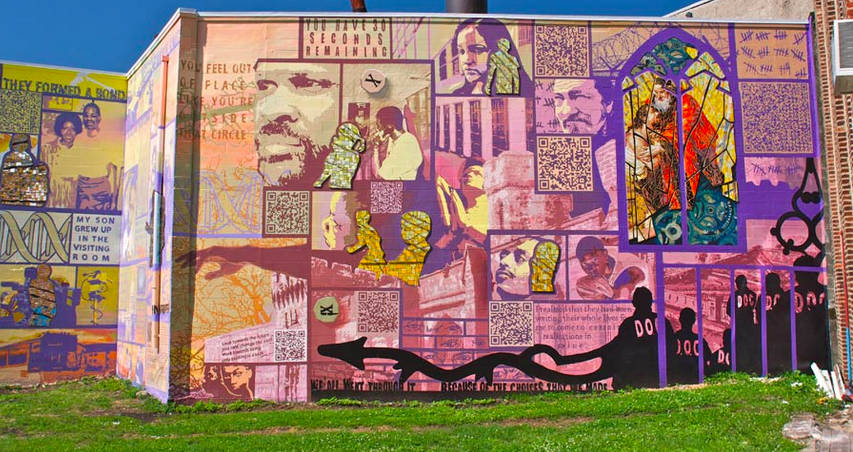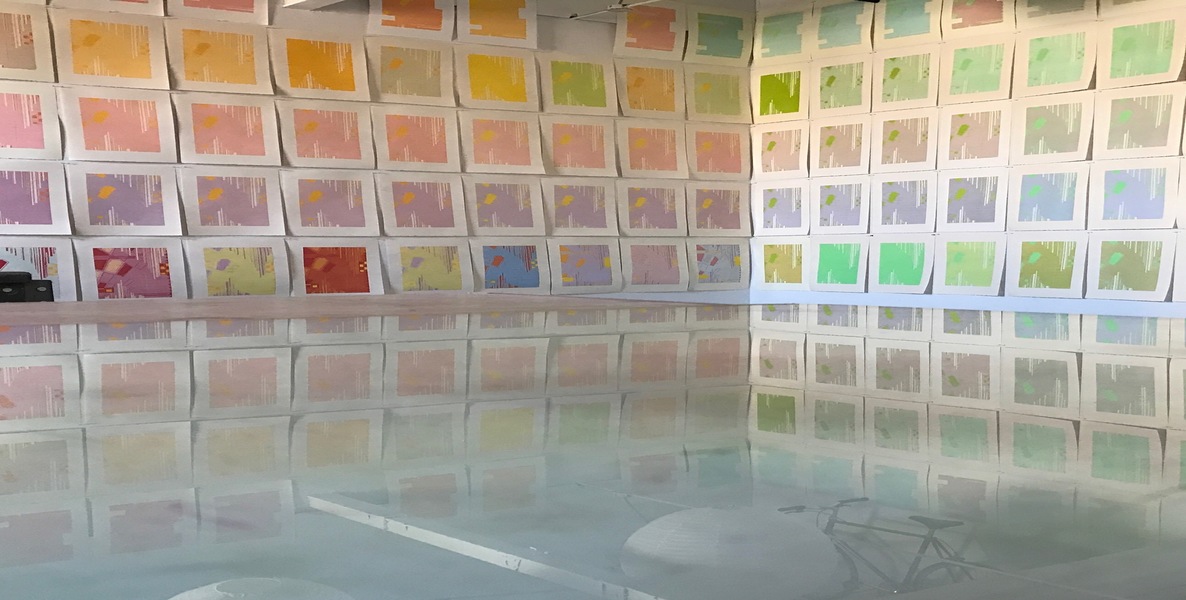When Lance and Melissa Rothstein, a middle-aged couple from Greenhill Farms, first heard about Community Supported Art Philadelphia at a First Friday event back in 2012, they didn’t think twice about signing up. As the son of an Oklahoma City-based art dealer who exclusively represented local artists, Lance has always been an ardent supporter of local arts. He was at that event, in fact, to keep tabs on the many local artist collectives (such as Vox Populi, Tiger Strikes Asteroid, and Grizzly Grizzly) that had moved into the Rollins Building on North 11th Street in Northern Liberties.
Now the couple was being offered the chance to support local artists from before they even started making their art—in much the same way people support local farms when they sign up for their produce CSAs. For $475 that year (which they knew was a great deal), the Rothsteins got 10 original pieces of art in different media by 10 local artists, whom they got to meet and visit (to see how the sausage is made). Not only did they add to their growing art collection, they became arts patrons in their adopted hometown.
That’s why the Rothsteins were among the first to sign up again this year, when Grizzly Grizzly announced its second CSA, just getting into full swing this summer. This time around, they’ll be supporting six artists for $475—still a steal for what they’re getting.
For collectors, the program offers a rare chance to be a patron of the as-yet-unproduced arts and join a community of local art supporters. For the artists, the model offers clear financial and creative advantages over selling through a traditional gallery.
The program is organized and curated by Grizzly Grizzly, a six-artist “collective of sharp edges” founded in 2009 to curate the work of other artists (but do not show their own). With the support of the City of Philadelphia, Grizzly Grizzly and another group, the Philadelphia Folklore Project, both ran art CSAs in 2012, launching their own versions of a model initially created by Springboard for the Arts in Minneapolis in 2010, that applied the community supported agriculture concept to the arts.
Registration for this season’s shareholders first opened in December 2016, but the artist selection process began well before that. Grizzly Grizzly reached out to the city’s curators, collectives and organizers to nominate artists (both emerging and established), over a year ago. Fifteen finalists were selected from an initial list of over 100 names, and the co-curators went on studio visits to meet with the artists, see their work in person, and talk about the project.
“Our aim is to give a wide range of contemporary art, so we have some artists working digitally, some with traditional materials like ceramics, printmaking or textiles, and some in book-form or drawing,” says Cindy Stockton Moore, a Grizzly Grizzly artist and organizer of the CSA.
Artists and shareholders, both in 2012 and now, recognize that being part of CSA Philadelphia is a unique opportunity—so unique, in fact, that a prominent curator of contemporary art at a major Philadelphia museum set an alarm for herself to register on opening day back in December 2016.
For the artists, the model offers clear financial and creative advantages over selling through a traditional gallery. Typically, artists seek out galleries, but in Philadelphia, where there are many art schools and not enough galleries, competition is steep. Even when an artist’s work is accepted and shown by a gallery, he or she is then banking on the right person walking through the door and falling in love with the work—at which point the artist receives half of the proceeds. And in order to appeal to those gallery visitors, artists may alter their original vision to make it more commercially viable.
Channels do exist for artists to market their work directly to buyers, such as online or at art fairs, but CSA Philadelphia is unusual because it enables shareholders to fund the creation of specific passion projects that might never be made (or purchased) otherwise.

“[Grizzly Grizzly & CO.’s] idea is that they want us to have our vision of the work, not some sort of commercial thing,” says Alexis Nutini, one of the artists represented in this year’s program and a printmaking adjunct professor at Tyler School of Art. “That’s pretty amazing.”
Nutini is creating an edition of colorful prints with superimposed geometric patterns, using a reduction woodcut technique. Receiving all of the funding up front has enabled him to buy enough materials to create a much larger project, and so he will make 200 prints in total. Fifty of these will go to the CSA but the rest, sold individually from his studio, will be priced at roughly $450 each (and buyers will get to pick the one they want).
In addition to the guaranteed income and increased creative freedom, part of what is exciting for the six artists in this year’s crop—Nutini, Julianna Foster, Grimaldi Baez, Leah Bailis, Marc Blumthal and Lucia Thomé—is knowing that their creations will exist. “Not in a box in their studios, but in people’s lives,” Moore says.
For collectors, the program offers a rare chance to be a patron of the as-yet-unproduced arts and join a community of local art supporters. Registration first opened in December 2016 but the first pickup event isn’t until September, intentionally leaving almost a year’s time for shareholders to witness the cultivation of prints, textile sculptures, and interactive drawings (among other artworks) from the seeds of an idea to the completed pieces that will be harvested for their personal collections.
“Our shareholders have already gotten a chance, from the beginning, to talk to the artists about what they’re going to make even before some of them have made it,” explains Moore. “So by the time we go through the pre-events and pick-up events, they really have more than a quick exchange at some table. It’s less about choosing a thing, and buying that thing, and putting it on your wall. It’s more about this process from the beginning.”
Roughly half of the 2017 CSA shares, limited to 50 and sold on a first-come, first-serve basis, have been claimed, and registration is still open. The current shareholders are, like the art, a mixed bag: Curators buying for their personal collections, small groups of artists who are splitting shares, and collectors in the mid-30s to mid-60s age range. Seventy-five percent live in Philly proper. Fifteen percent are, like the Rothsteins, from nearby suburbs, and a few others are from outside the Philly area completely.
“It’s about supporting local artists and encouraging an upstart to grow,” says Lance. “And if I can support that, and support not only that person, that gallery, but my city—that’s something that I really enjoy.”
Lance Rothstein admits that the program is not without its risks. When purchasing artwork this way, sight unseen, you may not always like what you get. (Kind of like when you sign up for an agriculture CSA). He kept all 10 works he received in 2012, but says he found it particularly difficult to display one piece: A painted rock on top of handprinted paper.
In the end, the Rothsteins did end up displaying “Paper Weight” by Brian Giniewski. But as art collectors, they own more pieces than they have space for on their wall. Some of the other shares are in flat file storage where they’ll remain until the display is rotated, or until the Rothsteins spend the money to frame them (which, in this case, would be more expensive than the artwork itself).
Nevertheless, the Rothsteins eagerly registered again for this year’s CSA. “It’s about supporting local artists and encouraging an upstart to grow,” says Lance. “And if I can support that, and support not only that person, that gallery, but my city—that’s something that I really enjoy.”
Clarification: A previous version of this article neglected to mention the full name of the Grizzly Grizzly artist quoted. She is Cindy Stockton Moore.
Header Photo: Alexis Nutini


